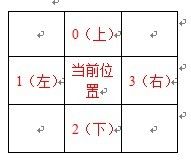Children of the Candy Corn(DFS、BFS)
Link:点击打开链接
转载请注明出处:優YoU http://user.qzone.qq.com/289065406/blog/1303432339
题目大意:
给定一个迷宫,S是起点,E是终点,#是墙不可走,.可以走
先输出左转优先时,从S到E的步数
再输出右转优先时,从S到E的步数
最后输出S到E的最短步数
W为宽,列数
H为高,行数
解题思路:
DFS和BFS的综合题水题,难度不大,但是写代码时要注意几方面:
1、 左转、右转优先搜索时必须标记当前位置时的方向,我定义的方向是
最初的方向由起点S确定,而下一步的方向则由前一步的走向决定
例如 左边优先搜索:
当前位置的方向指向 1(向左),(这同时说明前一步是在第“3”的位置走过来的)
那么走下一步时,就要根据2103的顺序,先逐格确定当前位置周边的四格是否可行
若第一次确认2可行,就走到2,在位置2时的方向为2(向下)
若2不可行,则再确定1,若1可行,就走到1,在位置1时的方向为1(向左)
若1也不可行,则再确定0,若0可行,就走到0,在位置0时的方向为0(向上)
若0也不可行,说明进入了迷宫的死胡同,要从原路返回,走回3
右边优先搜索也同理。
根据我定义的方向,设当前位置为d,那么
左转,用数学式子表达就是 d=(d+1)%4
右转,用数学式子表达就是 d=(d+3)%4
我比较懒,在我的程序中,DFS和BFS都用了多入口的做法,有兴趣的同学可以利用我给出的这两个式子对代码进行优化。
这里有一点必须要注意的:
左边、右边优先搜索都不是找最短路,因此走过的路可以再走,无需标记走过的格
2、 寻找最短路只能用BFS
因此在做第3问时别傻乎乎的又用DFS,DFS对于样例的输入确实和BFS得到的结果一样的,别以为样例PASS就提交了。。。所以我就说样例没代表性,学会测试数据很重要= =
注意有一点:
要求E的最短路,必须把迷宫模拟为树,S为根,找到E所在的层(树深),该层就是S到E的最短路,处理技巧就是在BFS时,令queue[tail]的depth等于对应的queue[head]的depth+1,详细见我的程序
把循环的次数作为深度就铁定错的
- //Memory Time
- // 212K 0MS
- #include<iostream>
- using namespace std;
- typedef class
- {
- public:
- int r,c;
- int depth;
- }SE;
- SE s,e; //起止点
- int Lstep; //左边优先搜索 时从S到E的总步数
- int Rstep; //右边优先搜索 时从S到E的总步数
- int shortstep; //S到E的最少总步数
- bool maze[41][41]; //记录迷宫的“可行域”与“墙”
- void DFS_LF(int i,int j,int d) //左边优先搜索,i,j为当前点坐标,d为当前位置方向
- {
- Lstep++;
- if(i==e.r && j==e.c)
- return;
- switch(d)
- {
- case 0:
- {
- if(maze[i][j-1])
- DFS_LF(i,j-1,1);
- else if(maze[i-1][j])
- DFS_LF(i-1,j,0);
- else if(maze[i][j+1])
- DFS_LF(i,j+1,3);
- else if(maze[i+1][j])
- DFS_LF(i+1,j,2);
- break;
- }
- case 1:
- {
- if(maze[i+1][j])
- DFS_LF(i+1,j,2);
- else if(maze[i][j-1])
- DFS_LF(i,j-1,1);
- else if(maze[i-1][j])
- DFS_LF(i-1,j,0);
- else if(maze[i][j+1])
- DFS_LF(i,j+1,3);
- break;
- }
- case 2:
- {
- if(maze[i][j+1])
- DFS_LF(i,j+1,3);
- else if(maze[i+1][j])
- DFS_LF(i+1,j,2);
- else if(maze[i][j-1])
- DFS_LF(i,j-1,1);
- else if(maze[i-1][j])
- DFS_LF(i-1,j,0);
- break;
- }
- case 3:
- {
- if(maze[i-1][j])
- DFS_LF(i-1,j,0);
- else if(maze[i][j+1])
- DFS_LF(i,j+1,3);
- else if(maze[i+1][j])
- DFS_LF(i+1,j,2);
- else if(maze[i][j-1])
- DFS_LF(i,j-1,1);
- break;
- }
- }
- return;
- }
- void DFS_RF(int i,int j,int d) //右边优先搜索,i,j为当前点坐标,d为当前位置方向
- {
- Rstep++;
- if(i==e.r && j==e.c)
- return;
- switch(d)
- {
- case 0:
- {
- if(maze[i][j+1])
- DFS_RF(i,j+1,3);
- else if(maze[i-1][j])
- DFS_RF(i-1,j,0);
- else if(maze[i][j-1])
- DFS_RF(i,j-1,1);
- else if(maze[i+1][j])
- DFS_RF(i+1,j,2);
- break;
- }
- case 1:
- {
- if(maze[i-1][j])
- DFS_RF(i-1,j,0);
- else if(maze[i][j-1])
- DFS_RF(i,j-1,1);
- else if(maze[i+1][j])
- DFS_RF(i+1,j,2);
- else if(maze[i][j+1])
- DFS_RF(i,j+1,3);
- break;
- }
- case 2:
- {
- if(maze[i][j-1])
- DFS_RF(i,j-1,1);
- else if(maze[i+1][j])
- DFS_RF(i+1,j,2);
- else if(maze[i][j+1])
- DFS_RF(i,j+1,3);
- else if(maze[i-1][j])
- DFS_RF(i-1,j,0);
- break;
- }
- case 3:
- {
- if(maze[i+1][j])
- DFS_RF(i+1,j,2);
- else if(maze[i][j+1])
- DFS_RF(i,j+1,3);
- else if(maze[i-1][j])
- DFS_RF(i-1,j,0);
- else if(maze[i][j-1])
- DFS_RF(i,j-1,1);
- break;
- }
- }
- return;
- }
- void BFS_MSS(int i,int j) //最短路搜索
- {
- bool vist[41][41]={false};
- SE queue[1600];
- int head,tail;
- queue[head=0].r=i;
- queue[tail=0].c=j;
- queue[tail++].depth=1; //当前树深标记,这是寻找最短路的关键点
- vist[i][j]=true;
- while(head<tail)
- {
- SE x=queue[head++];
- if(x.r==e.r && x.c==e.c)
- {
- cout<<x.depth<<endl;
- return;
- }
- if(maze[x.r][x.c-1] && !vist[x.r][x.c-1])
- {
- vist[x.r][x.c-1]=true;
- queue[tail].r=x.r;
- queue[tail].c=x.c-1;
- queue[tail++].depth=x.depth+1;
- }
- if(maze[x.r-1][x.c] && !vist[x.r-1][x.c])
- {
- vist[x.r-1][x.c]=true;
- queue[tail].r=x.r-1;
- queue[tail].c=x.c;
- queue[tail++].depth=x.depth+1;
- }
- if(maze[x.r][x.c+1] && !vist[x.r][x.c+1])
- {
- vist[x.r][x.c+1]=true;
- queue[tail].r=x.r;
- queue[tail].c=x.c+1;
- queue[tail++].depth=x.depth+1;
- }
- if(maze[x.r+1][x.c] && !vist[x.r+1][x.c])
- {
- vist[x.r+1][x.c]=true;
- queue[tail].r=x.r+1;
- queue[tail].c=x.c;
- queue[tail++].depth=x.depth+1;
- }
- }
- return;
- }
- int main(int i,int j)
- {
- int test;
- cin>>test;
- while(test--)
- {
- int direction; //起点S的初始方向
- int w,h; //size of maze
- cin>>w>>h;
- /*Initial*/
- Lstep=1;
- Rstep=1;
- memset(maze,false,sizeof(maze));
- /*Structure the Maze*/
- for(i=1;i<=h;i++)
- for(j=1;j<=w;j++)
- {
- char temp;
- cin>>temp;
- if(temp=='.')
- maze[i][j]=true;
- if(temp=='S')
- {
- maze[i][j]=true;
- s.r=i;
- s.c=j;
- if(i==h)
- direction=0;
- else if(j==w)
- direction=1;
- else if(i==1)
- direction=2;
- else if(j==1)
- direction=3;
- }
- if(temp=='E')
- {
- maze[i][j]=true;
- e.r=i;
- e.c=j;
- }
- }
- /*Left First Search*/
- switch(direction)
- {
- case 0: {DFS_LF(s.r-1,s.c,0); break;}
- case 1: {DFS_LF(s.r,s.c-1,1); break;}
- case 2: {DFS_LF(s.r+1,s.c,2); break;}
- case 3: {DFS_LF(s.r,s.c+1,3); break;}
- }
- cout<<Lstep<<' ';
- /*Right First Search*/
- switch(direction)
- {
- case 0: {DFS_RF(s.r-1,s.c,0); break;}
- case 1: {DFS_RF(s.r,s.c-1,1); break;}
- case 2: {DFS_RF(s.r+1,s.c,2); break;}
- case 3: {DFS_RF(s.r,s.c+1,3); break;}
- }
- cout<<Rstep<<' ';
- /*Most Short Step Search*/
- BFS_MSS(s.r,s.c);
- }
- return 0;
- }
{
int tx,ty;
if(x==ex&&y==ey)
{
printf("%d ",count);
return ;
}
count++;
for(int j=0;j<4;j++)
{
int i=(d+fl[j])%4;
tx=x+fx[i];
ty=y+fy[i];
if(tx>=0&&tx<h&&ty>=0&&ty<w&&maze[tx][ty]!='#')
{
dfsleft(i,tx,ty);
return;
}
}
}
void dfsright(int d,int x,int y)
{
int tx,ty;
if(x==ex&&y==ey)
{
printf("%d ",count);
return ;
}
for(int j=0;j<4;j++)
{
int i=(d+fr[j])%4;
tx=x+fx[i];
ty=y+fy[i];
if(tx>=0&&tx<h&&ty>=0&&ty<w&&maze[tx][ty]!='#')
{
count++;
dfsright(i,tx,ty);
return;
}
}
}
